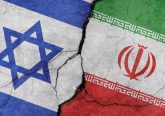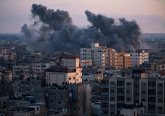 The Iraq war was not a success. It was a failure. A dismal failure, and Western governments should learn from their mistakes.
The Iraq war was not a success. It was a failure. A dismal failure, and Western governments should learn from their mistakes.
Of course, nobody can deny the brutal crimes that Saddam Hussein was responsible for. The savage attacks against the Kurdish population in Northern Iraq, the invasion of Kuwait and the terrorising of innocent civilians in the town of Dujail after an assassination attempt serve as prime examples of the sadistic nature of the Iraqi dictator. The world is definitely safer without him, but this in no way outweighs what the world, and in particular the Iraqi people, have had to give up.
Transparency International’s most recent Corruption Perception Index (measured in 2010) ranked Iraq as having 175th most public sector corruption, out of 178 countries. The ranking in 2003 stood at 113/130. John Bolton needs to recognise that removing a dictator doesn’t naturally create representative government (see his article in The Guardian). Corruption in Iraq is rife and has not atrophied (as some assumed it would) even after the fall of Saddam. To claim that Iraq now has a “representative government” is a step too far. After all, corruption does not act in the interests of the people, nor does it reflect public opinion. When trying to highlight such concerns the Iraqi media is a lot worse off than it was in 2003. According to the Annual Press Freedom Index provided by Reporters Without Borders, press freedom in the country has declined since the war. It is now ranked the 152nd least free out of the 179 countries in the survey. (Iraq was ranked 124th out of 166 surveyed countries in 2003.) The lack of press freedom is not only indicative of a lack of political freedom but, I feel, will act to limit social progress in the long term.
Moving on to more pressing concerns, the war in Iraq was a total failure if it aimed to combat extremism. According to the US approval rating system in the Middle East, 30% more people polled have a negative opinion of the US than in 2003. Terrorist’s attacks have increased exponentially and further Western intervention only adds fuel to the fire. Not only do these extremist opinions manifest themselves in attacks outside of the country, but they have also decreased the safety of the Iraqi people, who every day must cope with fear of abduction, murder and torture. Although news reports from certain provinces in the region may make Iraq look like a rosy place, shining with newly opened market stalls set up by the now “liberated youth”, I would urge that we should look beyond the optimistic idealism. There are still an estimated 1,000 Al Qaeda supporters living in the country and, with US troops leaving, violence is now directed at government officials instead. This year, on average, there have been 10 attacks per month directed at the Iraqi government and 2/3rds of these attacks have resulted in deaths. Iraq is not a safe place to live, and it does not seem to be getting safer.
When it comes to Iraqi finances the picture doesn’t look as bad, but it sure isn’t as great as some would have it. Before 2003, the country exported 2.5 million barrels of oil per day, and this figure today stands at just under 1.82. In fact, since the war, the country has never reached these 2003 levels, and for most of the past 8 years has exported between 1.2 – 1.7 million barrels per day. Further to this, levels of confidence both in the political and economic conditions in the country are extremely low: 52% of Iraqis think their country is headed in the wrong direction and 49% of the public think the economic situation is bad. With nearly 3 million Iraqis displaced after the war, we can only hope that the flood of FDI that is coming into the country can help to resolve the deep socio-economic problems that have resulted post-2003.
Lastly, the success or failure of the mission in Iraq is dependent on the objectives of the military operation led by the US. However, these very objectives remain clouded by public hysteria and political demagoguery. Iraq is by no means a safe country, a financially independent country, a stable country or a democratic country. We should not fool ourselves into thinking it is. To those who feel that Iraq is “better now” than it was in 2003, I would ask you to look at the statistics, as they present a contrasting picture. The total loss of civilian lives equivalent to 27 separate 9/11’s cannot be outweighed by minor changes on the ground. I urge Obama to put his political motivations aside and show some humility, accepting the invasion for what it was – a terrible mistake.
Abrar Nurani holds a PPE degree at Hertford College, Oxford.







No Comment